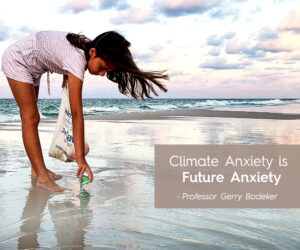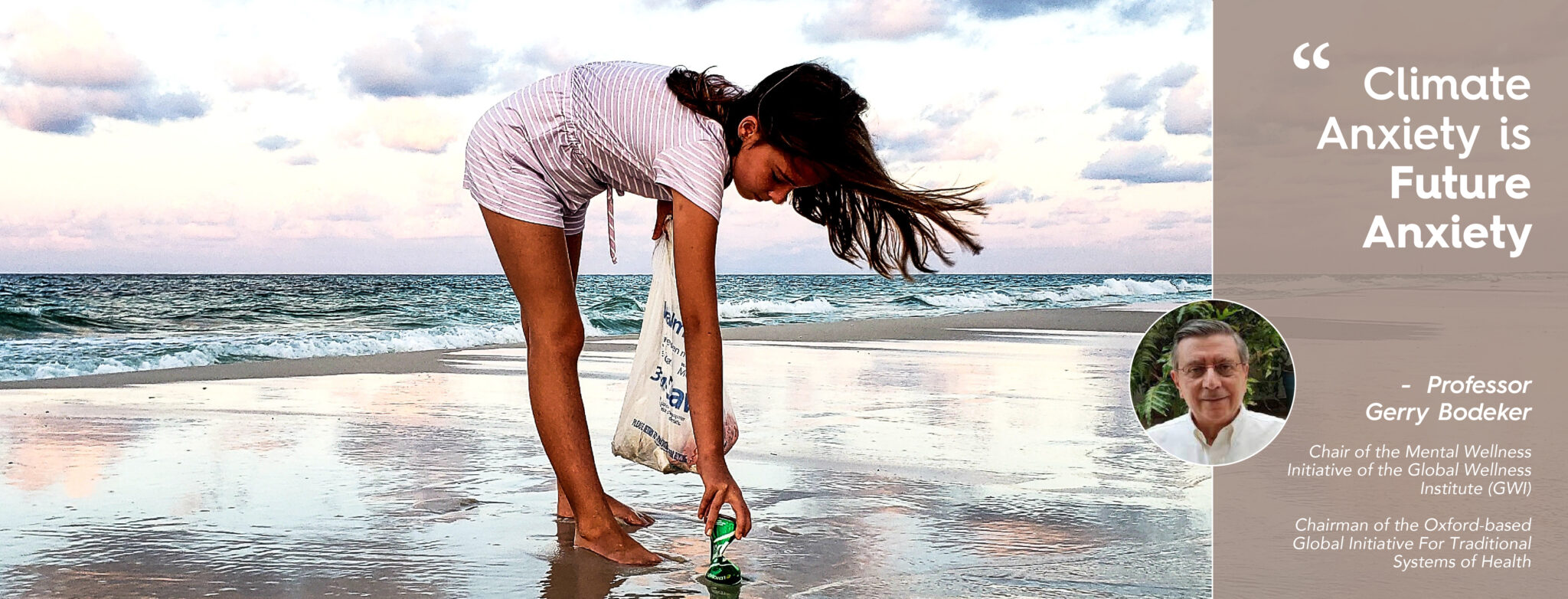Meet Professor Gerry Bodeker, a public health and clinical psychology expert with three decades of ground-breaking research at Oxford and Columbia Universities. He chairs the Mental Wellness Initiative at the Global Wellness Institute, holds a Harvard doctorate, and leads the Global Initiative for Traditional Systems of Health in Oxford. His influence spans private enterprises, governments, and global organizations like WHO and the Asian Development Bank, shaping culturally tailored wellness strategies.
Dr. Bodeker shares with us his insights regarding the impact of climate change and global uncertainties on youth mental health. He urges the wellness community to engage in vital discussions addressing climate anxiety, crucial for supporting the upcoming generation’s well-being in an uncertain world.

- U.N. Secretary-General, António Guterres said, after scientists confirmed that July 2023 was the world’s hottest month on record: “The era of global warming has ended and the era of global boiling has arrived. Climate change is here. It is terrifying. And it is just the beginning.”
- New studies are finding that people who worry about the Earth’s animals and plants are more likely than others to experience stress — and even depression — related to climate change.
- The U.N.’s Intergovernmental Panel on Climate Change (IPCC) reports that one large study of 10,000 children and young people in 10 countries found that 45% of respondents said their feelings about climate change negatively impacted their daily functioning. Another study found that negative, climate-related emotions were associated with more symptoms of insomnia and poor mental health.
- A survey reported in Lancet Planetary Health of ten thousand young people aged 16-25 across 10 countries found that 59% were very or extremely worried and 84% were at least moderately worried about climate change. More than 50% reported each of the following emotions: sad, anxious, angry, powerless, helpless, and guilty.
- At the same time, U.S. Surgeon General Dr. Vivek Murthy has been speaking about increasing access to care for youth and college students who struggle with depression, anxiety, loneliness and isolation. “One of the most important things we can do for other people is simply to check on them, to show up for them in their moments of need and to listen”, he says.
- A sense of security about the future is fundamental to good long-term mental health and wellness. In a fast-changing world with serious regional conflicts, a global environment that is becoming increasingly inhospitable, and a sense that economic factors are creating an uncertain future for future generations, young people’s mental health challenges are very real.
- What can the wellness community do to address these issues in a way that is meaningful beyond day-to-day coping strategies? Climate anxiety is ‘future anxiety’. We need to start this conversation if we are to stay relevant and helpful in charting a balanced way forward for future generations and emerging leaders in the face of an uncertain future for humanity and our planet.

The recent 28th UN Climate Change Conference (COP28) inaugurated the climate conference’s first Health Day last December 3, with over 40 million health professionals endorsing the World Health Organization’s (WHO) plea to prioritize health during climate negotiations. More than 120 countries signed the COP28 UAE Declaration on Climate and Health, emphasizing the severe health consequences of climate change and the immediate need for governments to develop and implement policies, encourage adequate financing, and ready healthcare systems for climate-related impacts including extreme heat, air pollution, and infectious diseases.
WHO Director-General Dr. Tedros Adhanom Ghebreyesus remarked on the new declaration, stating, “The climate crisis is a health crisis, but health has been a footnote in climate discussions for too long.” On Health Day, COP28 hosts, the United Arab Emirates, and various charities pledged $777 million in financing to combat neglected tropical diseases expected to rise due to the climate crisis.
This initiative follows the Africa Centres for Disease Control and Prevention Director-General Jean Kaseya’s assertion to Reuters that climate change constitutes the most significant threat to human health in Africa and globally.
Included in this first COP’s focus on health and climate change was the recognition that mental health is a serious issue, especially among young people.

